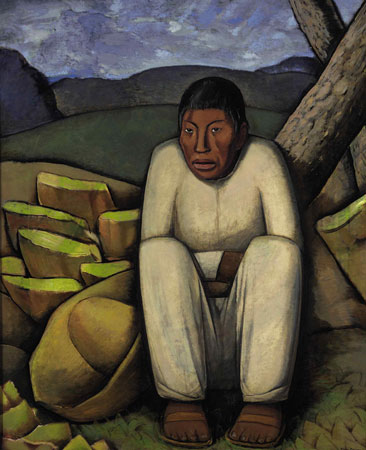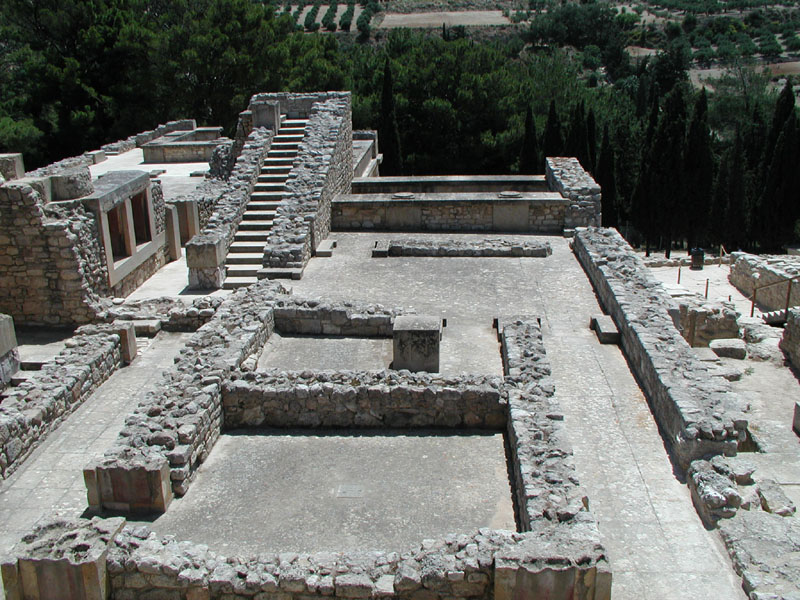
Octavio Paz
"The unexamined life is not worth living"
(1950, Spanish; 1953, English translation) Contents
There are three key moments in Mexican history: colonialism, independence and revolution.
In the Labyrinth of Solitude, Paz begins by focusing on the transitions from childhood, to adolescence, to adulthood while making a crucial relationship between the personal and the universal by comparing these significant periods of change in ourselves to the lives of the nations to which we are born. He then proceeds to look at the identity --the bicultural heritage of Mexico-- to discern the obstacles, opportunities and omens that have left his nation to face the 21st century with a divided tradition, a pattern of recurrent revolutions, and an inability to translate their ideals and aspirations into a national effort for effective reforms.
"Self discovery is above all the realization that we are alone: it is an opening of an impalpable, transparent wall -- that of our consciousness -- between us and the world."
His themes emerge that reveal:
Meaning | Main Themes | Four aspects of the Infantile | Interpretations
Four aspects of the Infantile
Infantile or responding as an infant would.
What does it mean to remain stuck in our infancy?
Four things:
Meaning | Main Themes | Four aspects of the Infantile | Interpretations | text
"he leans over the river of his consciousness, he asks himself if the face that appears in the there,... is his own."
Page 9.
This is an ancient Greek myth about a young, beautifully attractive person who upon looking into a pool of water, mistakes his reflection for a real person and he proceeds to fall in love with his own reflection, instead of the nymph echo who has professed her passion for him.
Paz alludes to the myth, and all creation myths as having a powerful hold on us because they are expressions of the human imagination created to make sense of the tragic circumstances in the world.
"But the adolescent cannot forget himself --when he succeeds in doing so, he is no longer and adolescent-- and we cannot escape the necessity of questioning and contemplating ourselves."
Page 11.
"He passes through life like a man who has been flayed ; everything can hurt him, including words and the very suspicion of words."
p. 29.
What is the meaning of Chapter Two's words?
"Chapter Two, Mexican Masks
The identity of People in the Americas is not straightforward
What Do we need to know?
In adolescence we confront the question of personal and universal identity.
Countries are like people in that at critical times they confront or hide their shame.
He Builds to:
The shame of humankind is that we have a memory to recall and in recalling we live in two worlds:
1) the world of what we did; hence what was done
2) the world of what we say we did; hence what was reported as having been done
The Main point is:
The dualism is inherent, intrinsic in human character:
He does this to contrast North American from Mexican American character traits.
In doing so he reveals the role of the hidden and the apparent qualities of life.
Mexican Masks - is but one-way for him to explain to us the quality of a dialectic
One reviewer wrote:
"A result is oscillation between violent resentment and passivity."
|
|
|
|
|
He refers literally to Mexican Masks and figuratively to the masks we all wear publicly to hide our shame, our emotions, & our instinctual responses to the world.
But he does so in order to teach us a Lesson:
Such a lesson is that the meaning of the Americas is hidden in the Caribbean's past. And like a pirate's buried treasure, history revels & reveals that the past is not what it appears to be because of what has been the tragedy and shame of the colonization and conquest of peoples who there once lived."
![]()
Paz, Octavio. The Labyrinth of Solitude. New York: Grove Press, 1961.
URL of this quote above is from the web page– http://www.hermitary.com/bookreviews/paz.html
© 2010, the hermitary and Meng-hu
Juno Diaz, The Brief Wondrous Life of Oscar Wao
Jamaica Kincaid, A Small Place
Meaning | Main Themes | Four aspects of the Infantile | Interpretations | text
![]()
Vocabulary:
impalpable, un-sensed, unseen, not able to fully apprehend and hence easily overlooked.
Ejido, common, pueblo land- a tradition dating pack to Pre columbian, Indian times.
 Labyrinth, literally the
lips of an opening, mouth of a cave, or entryway into a maze. Figuratively the
world we create in our minds with our language, impressions, visualizations
and imaginations due to the way we encounter the natural, physical and biological
realities of existence.
Labyrinth, literally the
lips of an opening, mouth of a cave, or entryway into a maze. Figuratively the
world we create in our minds with our language, impressions, visualizations
and imaginations due to the way we encounter the natural, physical and biological
realities of existence.
In Knossos, on the Island of Crete is a great structure, palace, and fortress known as the Maze, or Labyrinth of Knossos,built by Daedalus and his son Icarus and where legend has it a beast lived that devoured all that were unable to exit from the maze or Labyrinth of no return.
Metaphorically speaking:
Time may be thought of as a maze from which there is no return. "History is a cruel reality of a nightmare."
Language, as spoken words since these names emerge from between our lips may be thought of as a labyrinth, the maze of language can often confound the user who may, confuse the words with what they actually mean. Thus identity, that is definitive concepts of who we are, may also be the maze into which we lose our self, in an endless search for ways, forms, objects, or beliefs to define who we are.
Meaning | Main Themes | Four aspects of the Infantile | Interpretations | text
The history of Mexico is the history of man seeking his parentage, his origins. . . . He wants to go back beyond the catastrophe he suffered; he wants to be a sun again, to return to the center of that life from which he was separated."
The Labyrinth of Solitude, p. 11.